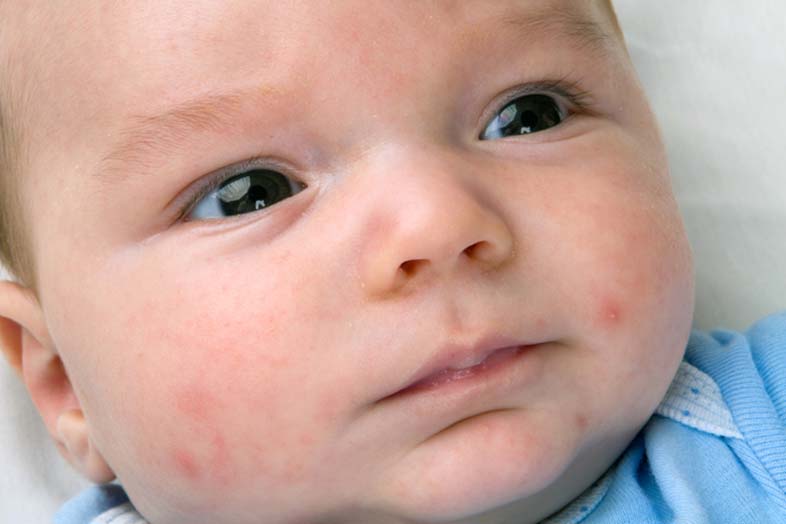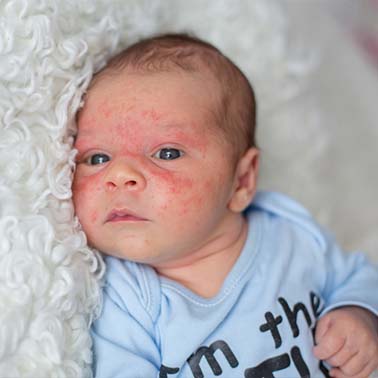All babies have beautiful skin, but did you know some newborns develop spots on their face in the early weeks? Sally J Hall discusses this common skin condition in babies with paediatric dermatologist Dr Tim Clayton MB CHB MRCPCH FRCP(Edin) of DermExpert.
In this article we cover:- What is baby acne?
- What are the causes of baby acne?
- When does it start
- What does baby acne look like?
- Treatment for baby acne
- When should you see a doctor?
- Will my baby's skin scar?
- Baby acne or rash: Could it be something else
What is baby acne?
Many parents are quite surprised that babies can get spots too! Don’t worry, this is perfectly normal for newborns, and the spots will quickly clear up quickly without the need to do very much.
As a paediatric dermatologist, I know that any little spot or blemish can be worrying for new parents. My advice would be to understand what’s normal, what you need to look out for and when you might need to seek out more help.
What are the causes of baby acne
Babies are born with very sensitive skin and like many parts of their tiny bodies, it is still developing. It has just spent nine months inside you in the amniotic fluid, so it’s no surprise that the change from this to being in the air can cause a few skin problems! While we don’t know exactly what causes baby acne, it’s likely that the hormones that have been flowing around inside your body during pregnancy are to blame.
So, is it like teenage acne?
Ina a way, yes. These hormones can stimulate the oil-producing glands in your baby's face. And in addition, your baby’s pores may become blocked by dead skin cells or dirt, and this may make the problem worse.
When does it start
These hormones usually start to cause problems from the second or third week of your baby’s life and may continue up to around their 12th week.

What does baby acne look like?
Your baby may have small red spots, raised bumps or what looks like a rash on their skin. Spots may be surrounded by clear skin, or there may be a collection of spots grouped together on a redder patch of skin.
Some spots may appear redder or angrier than others. You may even notice some small blackheads and clogged pores.
Treatment for baby acne
As baby acne usually clears itself, it’s best to err on the side of caution. You don't need to do much about your baby’s acne. The dos and don’ts to aid healing include:
Do
- Clean your baby’s face where affected with warm cotton wool and water a couple of times a day, or use Huggies® Extra Care Sensitive for on-the-spot clean ups. Gently dab or wipe, no need to scrub.
- Speak to your doctor to see if they can recommend any treatments, if the acne is particularly severe.
- Using your breastmilk for baby acne is a popular, gentle treatment. And it often works! Applying breastmilk can clear many skin problems.
Don't
- Try to squeeze or pick the spots.
- Use any skin products, lotions, or oils on the affected skin.
- Use acne products designed for adults.
When should you see a doctor?
If your baby’s acne doesn’t clear up on its own after a few weeks, speak to your doctor for advice. You should also seek medical support if it looks very red or you think it is possibly infected. Additionally, if your baby has a temperature, the spots have a discharge or look angry and inflamed, these may be indications of infection.
Will baby acne leave a scar?
Don’t worry, unless the spots are very large and inflamed, they usually do not leave scars. By the time your baby is a few months old, they will develop that wonderful peachy smooth skin.
Baby acne or rash: Could it be something else?
There are some other skin conditions and rashes that might be mistaken for newborn acne. And naturally, parents may worry that there is an underlying cause for a rash. Here are a few to look out for:
- Milia – these are white spots under the skin, caused by skin cells blocking pores. They usually disappear within the first few weeks.
- Erythema toxicum neonatorum – this is a red, blotchy rash on the face and body that usually clears up by itself and needs no further treatment.
- Heat rash – caused when your little one is too warm.
- Nappy rash – this is almost always restricted to beneath the nappy area.
- Cradle cap – this is usually a flaky condition of the scalp.
- Eczema – this is a condition of the skin that makes it dry and itchy. Speak to your health visitor or GP about ways to calm eczema.
- Rashes – there are several types of rash that your baby may have that are due to other health conditions, allergies and sensitivities. If you are at all in doubt or suspect that your baby might have a health condition that needs attention, always speak to your GP.
Be kind to the most gentle skin with Huggies® wipes
Our instinct as parents is to protect. When it comes to caring for your newborn, that new responsibility can be daunting. Huggies® have been helping parents clean, wipe and care for their little ones for years. Lean on us for expert advice on nappy rash, jaundice, baby massage and more.


 your parenting partner
your parenting partner